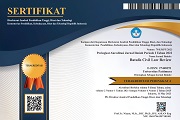E-contract Consensus in Indonesian Contract Law
 )
)
(1) Faculty of Law, Universitas Sriwijaya, Palembang, Indonesia
 Corresponding Author
Corresponding Author
Abstract
Introduction: In the era of Society 5.0, the use of IT in implementing agreements in Indonesia is inevitable. The development of e-contracts, becoming increasingly necessary in society, is demanding the business world's attention. Particularly in Indonesia's Treaty Law, the concept of consensual e-contracting emerged, suggesting that even in the absence of direct meetings, parties could still realize an agreement through the e-contract.
Purposes of the Research: This study aims to analyze and describe the existence of e-contract consensus in contract law in Indonesia from the point of view of contract theory.
Methods of the Research: This specific type of investigation is doctrinal law research, which endeavors to uncover the truth by employing legal principles, foundational doctrines, and doctrinal law as supporting material. This work utilizes an inductive methodology, first presenting specific assertions and then drawing a general conclusion from them.
Results of the Research: One of the legal prerequisites for an agreement is consensus. The study's findings indicate that legislative regulations in Indonesia have incorporated e-contract consensus into contract law. We apply Uitings theory, Verzending theory, and Ontvangs theory as agreement theories to determine the existence of e-contract consensus. The legislation contains provisions that specifically address the maintenance of electronic transactions. In general, it establishes that an electronic transaction has taken place when the parties to an electronic contract (e-contract) issue a statement of acceptance of an offer.Keywords
DOI
10.47268/ballrev.v5i2.1930
Published
2024-07-31
How To Cite
@article{BALLREV1930,
author = {Helena Sulistyaningrum},
title = {E-contract Consensus in Indonesian Contract Law},
journal = {Batulis Civil Law Review},
volume = {5},
number = {2},
year = {2024},
keywords = {Agreement; Consensus; E-contract.},
abstract = {Introduction: In the era of Society 5.0, the use of IT in implementing agreements in Indonesia is inevitable. The development of e-contracts, becoming increasingly necessary in society, is demanding the business world's attention. Particularly in Indonesia's Treaty Law, the concept of consensual e-contracting emerged, suggesting that even in the absence of direct meetings, parties could still realize an agreement through the e-contract. Purposes of the Research: This study aims to analyze and describe the existence of e-contract consensus in contract law in Indonesia from the point of view of contract theory. Methods of the Research: This specific type of investigation is doctrinal law research, which endeavors to uncover the truth by employing legal principles, foundational doctrines, and doctrinal law as supporting material. This work utilizes an inductive methodology, first presenting specific assertions and then drawing a general conclusion from them.Results of the Research: One of the legal prerequisites for an agreement is consensus. The study's findings indicate that legislative regulations in Indonesia have incorporated e-contract consensus into contract law. We apply Uitings theory, Verzending theory, and Ontvangs theory as agreement theories to determine the existence of e-contract consensus. The legislation contains provisions that specifically address the maintenance of electronic transactions. In general, it establishes that an electronic transaction has taken place when the parties to an electronic contract (e-contract) issue a statement of acceptance of an offer.},
issn = {2746-8151}, pages = {89--98} doi = {10.47268/ballrev.v5i2.1930},
url = {https://fhukum.unpatti.ac.id/jurnal/ballrev/article/view/1930}
}
Journal Article
Akbar, Ilham. “Akibat Hukum Cacat Kehendak Terkait Hakikat Benda Pada Perjanjian Jual Beli Batu Akik Bongkahan.” Syariah Jurnal Hukum Dan Pemikiran 16, no. 2 (2017): 97. https://doi.org/10.18592/sy.v16i2.1020.
Angga, La Ode, Barzah Latupono, Muchtar Anshary Hamid Labetubun, and Sabri Fataruba. “Effectiveness of Law Number 41 the Year 1999 in the Case of Illegal Logging in Maluku Province.” Cepalo 3, no. 2 (2019): 141–52. https://doi.org/10.25041/cepalo.v3no2.1848.
Bustomi, Abuyazid. “Kekuatan Mengikat Isi Dari Perjanjian Baku (Standard Contract) Bagi Para Pihak Yang Membuatnya.” Jurnal Fakultas Hukum 15 (2017): 376–81.
Emmy Latifah. “E-Contract Dalam Perspektif,” no. 5 (2007): 232–47.
Kunarso, Kunarso, and A Djoko Sumaryanto. “Eksistensi Perjanjian Ditengah Pandemi Covid-19.” Batulis Civil Law Review 1, no. 1 (2020): 33. https://doi.org/10.47268/ballrev.v1i1.423.
Labetubun, Muchtar Anshary Hamid. “A Legal Awareness of Copyright on Regional Song Creators.” International Journal of Law Reconstruction 5, no. 1 (2021): 49–61. https://doi.org/10.26532/ijlr.v5i1.15406.
Mersetyawati C. M. Lamber. “Legalitas Transaksi Penjulan Melalui Internet Ditinjau Dari Hukum Perdata.” Lex Privatum VI, no. 8 (2018): 110–19.
Moertiono, R Juli. “Perjanjian Kerjasama Dalam Bidang Pengkaryaan Dan Jasa Tenaga Kerja Antara Pt. Sinar Jaya Pura Abadi Dan Pt. Asianfast Marine Industries.” Jurnal Hukum Kaidah: Media Komunikasi Dan Informasi Hukum Dan Masyarakat, 2019. https://doi.org/10.30743/jhk.v18i3.1329.
Ndaomanu, Diah Anggraeni. “Kesepakatan Perjanjian Jual Beli Melalui Mesin Jual Otomatis (Vending Machine) Ditinjau Dari Aspek Hukum Perjanjian.” Jurnal Ilmu Hukum: ALETHEA 5, no. 1 (2022): 55–72. https://doi.org/10.24246/alethea.vol5.no1.p55-72.
Nurwullan, Siti, and Hendrik Fasco Siregar. “Aspek Normatif Asas Konsensualisme Dalam Penambahan Klausula Kontrak Tanpa Persetujuan Para Pihak.” Rechtsregel : Jurnal Ilmu Hukum 2, no. 1 (2019): 494–509. https://doi.org/10.32493/rjih.v2i1.2957.
Romadhoni, Ridwan, and Budi Dona Kharisma. “Aspek Hukum Kontrak Elektronik (E-Contract) Dalam Transaksi E-Commerce Yang Menggunakan Bitcoin Sebagai Alat Pembayaran.” Jurnal Privat Law 7, no. 1 (2019): 49. https://doi.org/10.20961/privat.v7i1.30098.
Sugiastuti, Natasya Yunita. “Formasi/ Terjadinya Hubungan Kontraktual Menurut Sistem Hukum Inggris.” Jurnal Hukum PRIORIS 4, no. 2 (2016): 175–203. https://doi.org/10.25105/prio.v4i2.383.
Zamroni, Mohammad. “Penafsiran Kontrak Dalam Perspektif Hermeneutik.” Yuridika 31, no. 3 (2017): 522. https://doi.org/10.20473/ydk.v31i3.4830.
Book
Berlianty, Teng. Hukum Organisasi Perusahaan. Sidoarjo: Zifatama Jawara, 2019.
Thesis, Online/World Wide Web and Others
Biondi, Glenn. “Analisis Yuridis Keabsahan Kesepakatan Melalui Surat Elektronik (E-Mail) Berdasarkan Hukum Indonesia.” Tesis, 2016, 1–163.
Hermansyah, Nanang. “Analisis Yuridis Eksistensi Asas Kebebasan Berkontrak Dalam Perjanjian Dewasa Ini (Standar Kontrak) Di Masyarakat.Pdf,” 2020.
Labetubun, Muchtar Anshary Hamid. “Perlindungan Hukum HaKI Atas Desain Industri Terhadap Produk Kerajinan Kerang Mutiara Dalan Pemberdayaan Usaha Kecil Di Kota Ambon.” Universitas Brawijaya, 2010.
Prastiwi, Mahar. “23 Berita Hoax Seputar Covid-19 Dan Penjelasan Pakar Pulmonologi UGM.” KOMPAS.com, 2021.
Rahmani, Oleh, and Timorita Yulianti. “Asas-Asas Perjanjian ( Akad ) Dalam Hukum Kontrak Syari ’ Ah” II, no. 1 (2008): 91–107.
Cited-By:
1. Legal effectiveness of business contracts in tin mining: Socio-legal and governance challenges in corporate–community relations in Indonesia
Derita Prapti Rahayu, Muhammad Rustamaji, Faisal Faisal, Rafiqa Sari
Resources Policy vol: 111 first page: 105767 year: 2025
Type: Journal [View Source]
| Dublin Core | PKP Metadata Items | Metadata for this Document | |
| 1. | Title | Title of document | E-contract Consensus in Indonesian Contract Law |
| 2. | Creator | Author's name, affiliation, country | Helena Primadianti Sulistyaningrum; Faculty of Law, Universitas Sriwijaya, Palembang; Indonesia |
| 3. | Subject | Discipline(s) | |
| 3. | Subject | Keyword(s) | Agreement; Consensus; E-contract. |
| 4. | Description | Abstract | Introduction: In the era of Society 5.0, the use of IT in implementing agreements in Indonesia is inevitable. The development of e-contracts, becoming increasingly necessary in society, is demanding the business world's attention. Particularly in Indonesia's Treaty Law, the concept of consensual e-contracting emerged, suggesting that even in the absence of direct meetings, parties could still realize an agreement through the e-contract. Purposes of the Research: This study aims to analyze and describe the existence of e-contract consensus in contract law in Indonesia from the point of view of contract theory. Methods of the Research: This specific type of investigation is doctrinal law research, which endeavors to uncover the truth by employing legal principles, foundational doctrines, and doctrinal law as supporting material. This work utilizes an inductive methodology, first presenting specific assertions and then drawing a general conclusion from them.Results of the Research: One of the legal prerequisites for an agreement is consensus. The study's findings indicate that legislative regulations in Indonesia have incorporated e-contract consensus into contract law. We apply Uitings theory, Verzending theory, and Ontvangs theory as agreement theories to determine the existence of e-contract consensus. The legislation contains provisions that specifically address the maintenance of electronic transactions. In general, it establishes that an electronic transaction has taken place when the parties to an electronic contract (e-contract) issue a statement of acceptance of an offer. |
| 5. | Publisher | Organizing agency, location | Faculty of Law, Universitas Pattimura |
| 6. | Contributor | Sponsor(s) | |
| 7. | Date | (YYYY-MM-DD) | 2024-07-31 |
| 8. | Type | Status & genre | Peer-reviewed Article |
| 8. | Type | Type | |
| 9. | Format | File format | |
| 10. | Identifier | Uniform Resource Identifier | https://fhukum.unpatti.ac.id/jurnal/ballrev/article/view/1930 |
| 10. | Identifier | Digital Object Identifier | 10.47268/ballrev.v5i2.1930 |
| 11. | Source | Title; vol., no. (year) | Batulis Civil Law Review; Vol 5, No 2 (2024): VOLUME 5 ISSUE 2, JULY 2024 |
| 12. | Language | English=en | en |
| 13. | Relation | Supp. Files | |
| 14. | Coverage | Geo-spatial location, chronological period, research sample (gender, age, etc.) | |
| 15. | Rights | Copyright and permissions | Copyright: Authors who publish their manuscripts in this Journal agree to the following conditions: 1. The copyright in each article belongs to the author, as well as the right to patent. 2. Authors are able to enter into separate, additional contractual arrangements for the non-exclusive distribution of the journal's published version of the work (e.g., post it to an institutional repository or publish it in a book), with an acknowledgment of its initial publication in this journal. 3. Authors are permitted and encouraged to post their work online (e.g., in institutional repositories or on their website) prior to and during the submission process, as it can lead to productive exchanges, as well as earlier and greater citation of published work. 4. Authors have the right to self-archiving of the article (Author Self-Archiving Policy)
Licence : Batulis Civil Law Review Journal is disseminated based on the Creative Commons Attribution-NonCommercial 4.0 International license terms. This license allows anyone to copy and redistribute this material in any form or format, compose, modify, and make derivatives of this material for any purpose. You cannot use this material for commercial purposes. You must specify an appropriate name, include a link to the license, and certify that any changes have been made. You can do this in a way that is appropriate, but does not imply that the licensor supports you or your use.
|
Copyright (c) 2024 Helena Primadianti Sulistyaningrum

This work is licensed under a Creative Commons Attribution-NonCommercial 4.0 International License.
Cited-By:
1. Legal effectiveness of business contracts in tin mining: Socio-legal and governance challenges in corporate–community relations in Indonesia
Derita Prapti Rahayu, Muhammad Rustamaji, Faisal Faisal, Rafiqa Sari
Resources Policy vol: 111 first page: 105767 year: 2025
Type: Journal [View Source]

 : 2282 times
: 2282 times Download : 1225 times
Download : 1225 times














